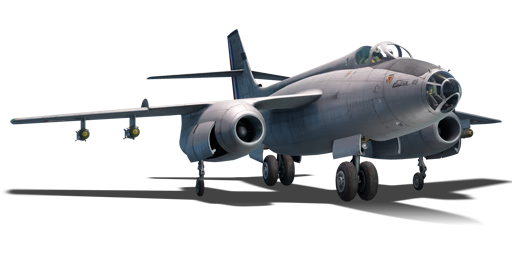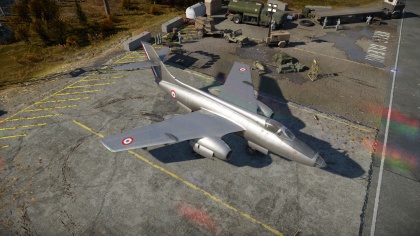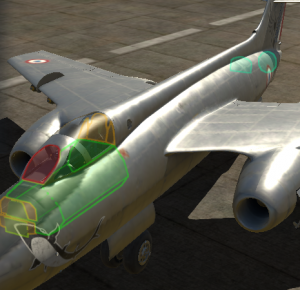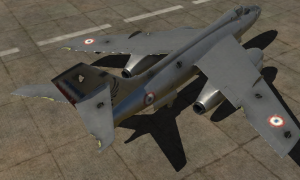Difference between revisions of "S.O.4050 Vautour IIB"
(→Pros and cons) (Tag: Visual edit) |
(Edits.) |
||
| Line 58: | Line 58: | ||
====Details==== | ====Details==== | ||
| + | [[File:Vautour IIb fuel tanks.png|right|thumb|300px|Vautour IIb's self-sealing fuel tanks (fuel tanks are outlined in red)]] | ||
{| class="wikitable" style="text-align:center" | {| class="wikitable" style="text-align:center" | ||
|- | |- | ||
| Line 130: | Line 131: | ||
|- --> | |- --> | ||
|} | |} | ||
| − | + | [[File:Armor plates Vautour IIb.png|right|thumb|300px|Red = 50 mm Bulletproof glassYellow = 13.5 mm Steel plate Yellowish green = 6 mm Steel plate Green = 3 mm Steel plate Turquoise = 2 mm Steel plate]] | |
=== Survivability and armour === | === Survivability and armour === | ||
<!--''Examine the survivability of the aircraft. Note how vulnerable the structure is and how secure the pilot is, whether the fuel tanks are armoured. Describe the armour, if there is any, also mention the vulnerability of other critical aircraft systems.''--> | <!--''Examine the survivability of the aircraft. Note how vulnerable the structure is and how secure the pilot is, whether the fuel tanks are armoured. Describe the armour, if there is any, also mention the vulnerability of other critical aircraft systems.''--> | ||
| − | * 50 mm Bulletproof glass in front of pilot. | + | * 50 mm Bulletproof glass in front of the pilot. |
* 13.5 mm Steel plate behind the pilot's head. | * 13.5 mm Steel plate behind the pilot's head. | ||
* 6 + 13.5 mm Steel plate in nose. | * 6 + 13.5 mm Steel plate in nose. | ||
| Line 140: | Line 141: | ||
* 2 mm Steel plate behind the fuel cells. | * 2 mm Steel plate behind the fuel cells. | ||
* 2 mm Steel plate in the tail. | * 2 mm Steel plate in the tail. | ||
| − | |||
== Armaments == | == Armaments == | ||
| Line 162: | Line 162: | ||
== Usage in the battles == | == Usage in the battles == | ||
| − | There are | + | <!--''Describe the tactics of playing in an aircraft, the features of using vehicles in a team and advice on tactics. Refrain from creating a "guide" - do not impose a single point of view but give the reader food for thought. Examine the most dangerous enemies and give recommendations on fighting them. If necessary, note the specifics of the game in different modes (AB, RB, SB).''--> |
| + | |||
| + | There are two ways you can go about using the Vautour IIb, either dive or keep your altitude from your air spawn. | ||
| − | + | ;Diving | |
| − | One way of playing the Vautour IIb is diving | + | One way of playing the Vautour IIb is diving a tactic also known as rushing into a base bombing point and bombing it. This comes with it's pros and cons. |
| − | + | Pros of diving: | |
* Guaranteed to bomb a base if it's a small enough map | * Guaranteed to bomb a base if it's a small enough map | ||
| Line 173: | Line 175: | ||
* Use your insane top speed to your advantage | * Use your insane top speed to your advantage | ||
| − | + | Cons of diving: | |
* If you are too slow, you will be easy prey | * If you are too slow, you will be easy prey | ||
| − | * Depends on the map | + | * Depends on the map, some don't work as well for this tactic |
* Lose your altitude | * Lose your altitude | ||
| − | + | ;Keeping your altitude | |
| − | The other way of using the Vautour IIb | + | The other way of using the Vautour IIb is by keeping your altitude and climbing and then using your bombsight to bomb a base. |
| − | + | Pros in staying at high altitude: | |
| − | * You are | + | * You are safer |
* Don't lose your altitude | * Don't lose your altitude | ||
* Can be used on any map | * Can be used on any map | ||
| − | + | Cons in staying at high altitude: | |
* Bombing can be inaccurate at high speed and high altitude | * Bombing can be inaccurate at high speed and high altitude | ||
* Longer to reach bombing point | * Longer to reach bombing point | ||
| − | * In an | + | * In an up-tier situation, F-100s may catch you and destroy you before reaching the bombsite |
===Manual Engine Control=== | ===Manual Engine Control=== | ||
| Line 254: | Line 256: | ||
* Climbs exceptionally well without ordnance | * Climbs exceptionally well without ordnance | ||
* Energy retention is great | * Energy retention is great | ||
| − | * Airbrakes | + | * Airbrakes, you will need them to avoid compressing in a dive |
| − | * | + | * Bombsight |
* Guaranteed profit every game | * Guaranteed profit every game | ||
* Airspawn | * Airspawn | ||
| Line 263: | Line 265: | ||
* Lacks the rocket payload options of the Vautour IIA | * Lacks the rocket payload options of the Vautour IIA | ||
* Compresses at high speed | * Compresses at high speed | ||
| − | * Massive penalties in flight performance when carrying full payloads | + | * Massive penalties in-flight performance when carrying full payloads |
* Turns like a brick | * Turns like a brick | ||
* Roll rate is also unimpressive | * Roll rate is also unimpressive | ||
| Line 275: | Line 277: | ||
<!--Describe the history of the creation and combat usage of the aircraft in more detail than in the introduction. If the historical reference turns out to be too long, take it to a separate article, taking a link to the article about the vehicle and adding a block "/ History" (example: <nowiki>https://wiki.warthunder.com/(Vehicle-name)/History</nowiki>) and add a link to it here using the <code>main</code> template. Be sure to reference text and sources by using <code><nowiki><ref></nowiki></code>, as well as adding them at the end of the article. This section may also include the vehicle's dev blog entry (if applicable) and the in-game encyclopedia description (under <code><nowiki>=== In-game description ===</nowiki></code>, also if applicable).--> | <!--Describe the history of the creation and combat usage of the aircraft in more detail than in the introduction. If the historical reference turns out to be too long, take it to a separate article, taking a link to the article about the vehicle and adding a block "/ History" (example: <nowiki>https://wiki.warthunder.com/(Vehicle-name)/History</nowiki>) and add a link to it here using the <code>main</code> template. Be sure to reference text and sources by using <code><nowiki><ref></nowiki></code>, as well as adding them at the end of the article. This section may also include the vehicle's dev blog entry (if applicable) and the in-game encyclopedia description (under <code><nowiki>=== In-game description ===</nowiki></code>, also if applicable).--> | ||
| − | The S.O.4050 Vautour IIB was developed by Sud Aviation after World War Two to meet the demand for the French Armeè de l'Air. This was a challenging task, after the German occupation in France. Many aircraft design teams have scattered. France was also new to the new jet propulsion area. The requirements issued by the French government called for a jet-powered multi-role attack aircraft that can perform as a bomber, low-level attack aircraft, and an all-weather interceptor. SNCASO met those requirements with a modified version of the S.O 4000. The new plane was designated the S.O.4050 Vautour and was manufactured in three different variants. The plane would serve in the AdA for several decades before replaced the newer Dassault Mirage. The Vautour was also one of the stop-gap measures used by the AdA as a nuclear deterrent. The Vautour would later be exported to Israel and serve with the IAF to counter | + | The S.O.4050 Vautour IIB was developed by Sud Aviation after World War Two to meet the demand for the French Armeè de l'Air. This was a challenging task, after the German occupation in France. Many aircraft design teams have scattered. France was also new to the new jet propulsion area. The requirements issued by the French government called for a jet-powered multi-role attack aircraft that can perform as a bomber, low-level attack aircraft, and an all-weather interceptor. SNCASO met those requirements with a modified version of the S.O 4000. The new plane was designated the S.O.4050 Vautour and was manufactured in three different variants. The plane would serve in the AdA for several decades before replaced the newer Dassault Mirage. The Vautour was also one of the stop-gap measures used by the AdA as a nuclear deterrent. The Vautour would later be exported to Israel and serve with the IAF to counter Egypt's IL-28 twin-engine bomber. |
| − | The IIB, which differed from the previous IIA by adding a second crew member in a transparent nose, was a dedicated bomber variant. Its prototype first flew in December | + | The IIB, which differed from the previous IIA by adding a second crew member in a transparent nose, was a dedicated bomber variant. Its prototype first flew in December 1954. In total 40 of the IIB would be built. All were sold along with all of France's Vautour IIAs to Israel in 1960. |
== Media == | == Media == | ||
Revision as of 14:07, 4 November 2019
Contents
| This page is about the French jet bomber S.O.4050 Vautour IIB. For other versions, see S.O.4050 Vautour IIA and Vautour IIA IDF/AF (France). |
Description
The S.O.4050 Vautour IIB is a Rank VI French jet bomber
with a battle rating of 9.7 (AB) and 9.0 (RB/SB). This aircraft was introduced in Update 1.73 "Vive la France".
General info
Flight Performance
| Characteristics | |||||||
|---|---|---|---|---|---|---|---|
| Stock | |||||||
| Max Speed (km/h at sea level) |
Max altitude (meters) |
Turn time (seconds) |
Rate of climb (meters/second) |
Take-off run (meters) | |||
| AB | RB | AB | RB | AB | RB | ||
| 1102 | 1098 | 15,000 | 32.6 | 33.2 | 43.6 | 39.7 | 900 |
| Upgraded | |||||||
| Max Speed (km/h at sea level) |
Max altitude (meters) | Turn time (seconds) | Rate of climb (meters/second) |
Take-off run (meters) | |||
| AB | RB | AB | RB | AB | RB | ||
| 1113 | 1107 | 15,000 | 31.5 | 32.0 | 68.2 | 55.0 | 900 |
Details
| Features | ||||
|---|---|---|---|---|
| Combat flap | Take-off flap | Landing flap | Air brakes | Arrestor gear |
| ✓ | ✓ | ✓ | ✓ | X |
| Limits | ||||
|---|---|---|---|---|
| Wing-break speed (km/h) |
Gear limit (km/h) |
Combat flap (km/h) |
Max Static G | |
| + | - | |||
| ??? | ??? | ??? | ~?? | ~? |
| Optimal velocities | |||
|---|---|---|---|
| Ailerons (km/h) |
Rudder (km/h) |
Elevators (km/h) |
Radiator (km/h) |
| < ??? | < ??? | < ??? | > ??? |
| Compressor (RB/SB) | ||
|---|---|---|
| Setting 1 | ||
| Optimal altitude | 100% Engine power | WEP Engine power |
| ?,??? m | 3380 kgf | 3891 kgf |
Survivability and armour
- 50 mm Bulletproof glass in front of the pilot.
- 13.5 mm Steel plate behind the pilot's head.
- 6 + 13.5 mm Steel plate in nose.
- 3 mm Steel shell surrounding the cockpit in the fuselage.
- 2 mm Steel plate behind the fuel cells.
- 2 mm Steel plate in the tail.
Armaments
Suspended armament
The S.O.4050 Vautour IIB can be outfitted with the following ordinance:
- 10 x 250 lb AN-M57 bombs (2,500 lb total)
- 10 x 500 lb AN-M64A1 bombs (5,000 lb total)
- 10 x 750 lb M117 cone 45 bombs (7,500 lb total)
- 6 x 1,000 lb AN-M65A1 Fin M129 bombs (6,000 lb total)
Usage in the battles
There are two ways you can go about using the Vautour IIb, either dive or keep your altitude from your air spawn.
- Diving
One way of playing the Vautour IIb is diving a tactic also known as rushing into a base bombing point and bombing it. This comes with it's pros and cons.
Pros of diving:
- Guaranteed to bomb a base if it's a small enough map
- You can return to base quicker
- Use your insane top speed to your advantage
Cons of diving:
- If you are too slow, you will be easy prey
- Depends on the map, some don't work as well for this tactic
- Lose your altitude
- Keeping your altitude
The other way of using the Vautour IIb is by keeping your altitude and climbing and then using your bombsight to bomb a base.
Pros in staying at high altitude:
- You are safer
- Don't lose your altitude
- Can be used on any map
Cons in staying at high altitude:
- Bombing can be inaccurate at high speed and high altitude
- Longer to reach bombing point
- In an up-tier situation, F-100s may catch you and destroy you before reaching the bombsite
Manual Engine Control
| MEC elements | ||||||
|---|---|---|---|---|---|---|
| Mixer | Pitch | Radiator | Supercharger | Turbocharger | ||
| Oil | Water | Type | ||||
| Not controllable | Controllable Automatic pitch |
Controllable | Not controllable | Combined | Controllable | Not controllable |
Modules
| Tier | Flight performance | Survivability | Weaponry | |
|---|---|---|---|---|
| I | Fuselage repair | SBC-17 | ||
| II | New boosters | Compressor | Airframe | M117 |
| III | Wings repair | Engine | LBC-25 | |
| IV | G-suit | Cover |
Pros and cons
Pros:
- Insane acceleration
- Climbs exceptionally well without ordnance
- Energy retention is great
- Airbrakes, you will need them to avoid compressing in a dive
- Bombsight
- Guaranteed profit every game
- Airspawn
Cons:
- Lacks the rocket payload options of the Vautour IIA
- Compresses at high speed
- Massive penalties in-flight performance when carrying full payloads
- Turns like a brick
- Roll rate is also unimpressive
- Fragile engines; a hit to an engine will make you easy prey for enemy fighters
- Relies heavily on team support even more than the Vautour IIA does
- Massive target
- No offensive armament
- 110% will easily overheat your engines after short use
History
The S.O.4050 Vautour IIB was developed by Sud Aviation after World War Two to meet the demand for the French Armeè de l'Air. This was a challenging task, after the German occupation in France. Many aircraft design teams have scattered. France was also new to the new jet propulsion area. The requirements issued by the French government called for a jet-powered multi-role attack aircraft that can perform as a bomber, low-level attack aircraft, and an all-weather interceptor. SNCASO met those requirements with a modified version of the S.O 4000. The new plane was designated the S.O.4050 Vautour and was manufactured in three different variants. The plane would serve in the AdA for several decades before replaced the newer Dassault Mirage. The Vautour was also one of the stop-gap measures used by the AdA as a nuclear deterrent. The Vautour would later be exported to Israel and serve with the IAF to counter Egypt's IL-28 twin-engine bomber.
The IIB, which differed from the previous IIA by adding a second crew member in a transparent nose, was a dedicated bomber variant. Its prototype first flew in December 1954. In total 40 of the IIB would be built. All were sold along with all of France's Vautour IIAs to Israel in 1960.
Media
Read also
Links to the articles on the War Thunder Wiki that you think will be useful for the reader, for example,
- reference to the series of the aircraft;
- links to approximate analogues of other nations and research trees.
Sources
Paste links to sources and external resources, such as:
- topic on the official game forum;
- page on aircraft encyclopedia;
- other literature.
| France fighters | |
|---|---|
| Dewoitine | D.371 · D.371 H.S.9 · D.373 · D.500 · D.501 · Pallier's D.510 · D.520 |
| Morane-Saulnier | M.S.405C1 · M.S.406C1 · M.S.410 |
| Arsenal | V.G.33C-1 |
| Bloch | M.B.152C1 · M.B.157 |
| Caudron | C.R.714 |
| Sud-Ouest | S.O.8000 Narval |
| American | H-75A-1 · H-75A-4 · ▄P-39Q-25 · ▄P-40F-5 Lafayette · ▄P-47D-22-RE · ▄P-63C-5 · F-6C-10-NA |
| ▄F6F-5 · ▄F6F-5N · F4U-7 · ▄F8F-1B | |
| Other countries | ▄Seafire LF Mk.III · ▄Yak-3 · Challe's ▄Yak-9T · NC.900 |
| Belgium | ▄Gladiator Mk I · ▄Spitfire FR Mk XIVe |
| Netherlands | ◘Sea Fury FB 51 |







